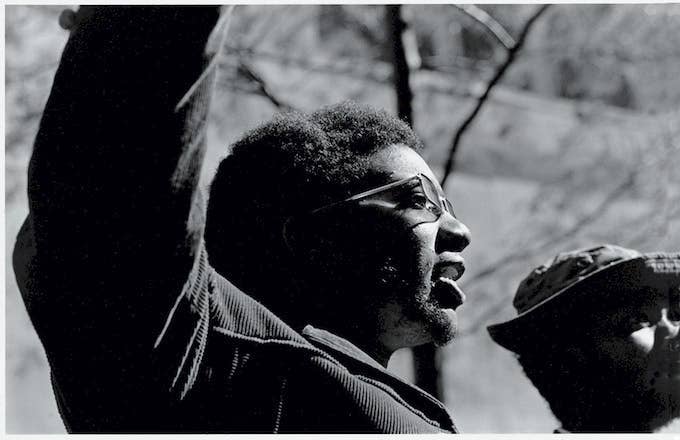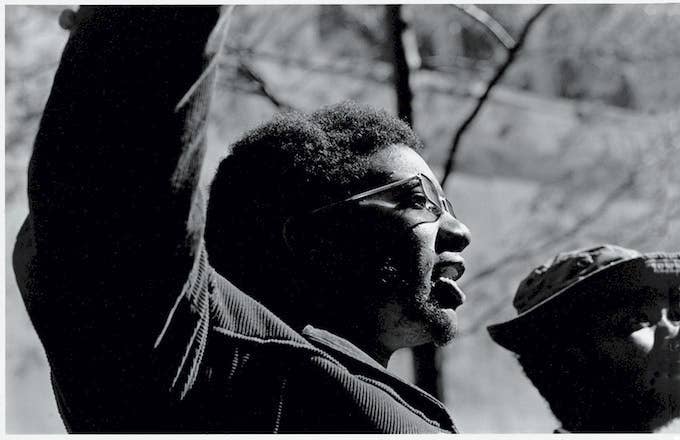
In the middle of the talk about jaunts to Paris and other-other-Benzes on Watch the Throne, Jay Z dropped a line attempting to show connections between generations of black activism. "I arrived on the day Fred Hampton died," he rapped on "Murder to Excellence." "Real niggas just multiply."
And, per Hov's insistence on #SuperFacts, the math checks out. Jay's born day—December 4, 1969—was the day when Black Panther Party deputy chairman Fred Hampton, as well as fellow Panther Mark Clark, were murdered by a coalition of the FBI and Chicago police.
The circumstances surrounding the murder are horrifying. A raid was being planned on Hampton's apartment, ostensibly to find weapons, but really to kill him. Hampton was drugged with secobarbitol by an FBI informant who was the Panthers chief of security (and who was paid $300 for his role in the murder). The BPP leader was shot while in bed with his fiancé Deborah Johnson, who was eight-and-a-half months pregnant at the time. Here are Johnson's memories of the early-morning raid, via an interview with Democracy Now:
Someone came into the room, started shaking the chairman, said, “Chairman, Chairman, wake up. The pigs are vamping.” Still half asleep, I looked up, and I saw bullets coming from, it looked like, the front of the apartment, from the kitchen area. They were—pigs were just shooting.
A federal investigation would later show that the cops fired around 90 shots, while the Panthers shot just once. Cook County State's Attorney Edward V. Hanrahan, involved in planning the raid—and who, not coincidentally, was a frequent target of Hampton's criticism—was indicted, as were 13 cops. All were acquitted, in a pattern that sadly continues today.
The only reason an investigation happened at all, and that we know the real story of Hampton and Clark's murder, is because of ceaseless agitation in the days following the raid. The police claimed, of course, that there was a shootout, and they were justified in opening fire. But over the next eight years, activists fought to get the real story out. It took until April, 1979, but the Seventh Circuit Court of Appeals ruled that there was "serious evidence" that the FBI and the Chicago PD were part of a "conspiracy designed to subvert and eliminate the Black Panther Party and its members."
Hampton was only 21 (Clark, shot as police entered the apartment, was just a year older), but had already established himself as a prominent voice in the movement for black liberation. One of his primary concerns was with establishing a multi-racial radical front to fight capitalism. He founded the original Rainbow Coalition, well before Jesse Jackson adopted the same name for his efforts. Hampton's Rainbow was a unification of the Chicago Black Panther Party, Puerto Rican Young Lords, and Poor White Young Patriots Organization. As Hampton phrased it, "We're gonna fight racism not with racism, but we're gonna fight it with solidarity."
The vision of a multi-racial coalition uniting to fight their true oppressors may seem farther away than ever in a world of increasing white supremacy and fragility. But if Hampton and the BPP could unite three disparate radical movements in the face of dogged state repression nearly half a century ago, there's hope that it could happen again. And the long fight for the truth about Hampton's murder to be made public is something to keep in mind as the number of officer-involved shootings, as they are euphemistically called, keeps growing.
So as you're celebrating Jay Z today by blasting "Empire State of Mind" extra-loud, take time to learn about Chairman Fred and his legacy, and remind yourself that victories in the fight for justice are hard-fought, but they do happen. And remember Hampton's admonition about whose purposes racism really serves. "Racism is an excuse used for capitalism," he said in a lecture. "We know that racism is a by-product of capitalism."


